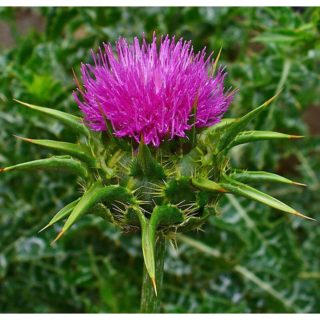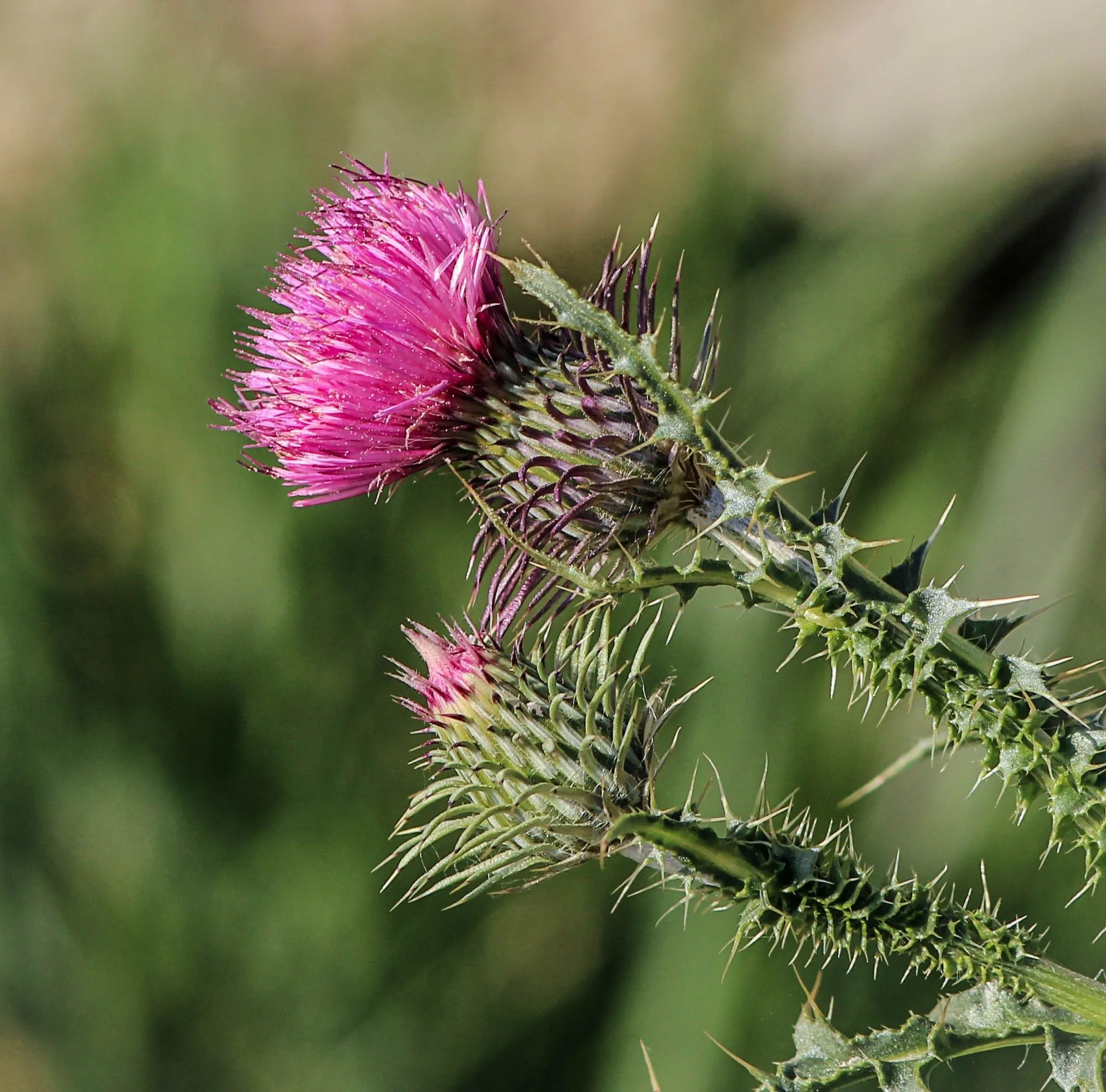Milk thistle is also known as Mary thistle or Holy thistle. The reason behind these alternative names is an old narrative. According to the story, the plant’s distinctive white veins were caused by a ‘drop of the Virgin Mary’s milk falling onto its leaves’. The active ingredient in milk thistle is called silymarin (1) (2). Silymarin is actually a group of plant compounds that is extracted from the plant. This herbal remedy is widely known as milk thistle extract and ‘is known to have antioxidant, antiviral, and anti-inflammatory properties’ (2). Commonly though, it is used to treat liver problems (1).
What exactly is milk thistle?
 Milk thistle itself is a flowering plant that is part of the daisy family. It is common in Mediterranean countries and is used as a component of natural remedies and supplements. Originally only native to Europe, it can now be found ‘throughout the eastern United States, California, and South America’ (3). It can grow up to 2 meters high and has large, bright purple flowers.
Milk thistle itself is a flowering plant that is part of the daisy family. It is common in Mediterranean countries and is used as a component of natural remedies and supplements. Originally only native to Europe, it can now be found ‘throughout the eastern United States, California, and South America’ (3). It can grow up to 2 meters high and has large, bright purple flowers.
It got its name because of the milk-like sap which is excreted when the leaves are broken. Different parts of the plant are used to treat different ailments. The most common use of milk thistle is for liver problems. However, [it is claimed] that it can also aid in the treatment of cirrhosis, jaundice, hepatitis, and gallbladder problems (1). There are also claims that it may also be useful for reducing cholesterol and treating and managing type 2 diabetes (1)
Some Health Benefits
Liver Health: Milk thistle is regularly used as a complementary treatment for liver conditions. These conditions include alcoholic liver disease, non-alcoholic fatty liver disease, hepatitis, and even liver cancer (2) (6) (7). Silymarin acts as an antioxidant, reducing the production of free radicals (1). It is theorized by scientists that this creates a detoxifying effect.
Skin Health: A 2015 study [performed on mice] found that milk thistle helped to reduce inflammation of the skin. It has also been found to have ‘antioxidant and anti-aging effects on human skin cells’ when tested in laboratory conditions (1) (8).
Reduce cholesterol: High cholesterol is bad for health and can lead to an increased chance of stroke. A study in 2006 found that milk thistle is beneficial in keeping cholesterol levels down (1). The study found that cholesterol levels were lower in the group taking milk thistle than they were in the group taking the placebo (1) (9).
Support weight loss: In a study conducted on mice in 2016, it was found that silymarin caused weight loss. This was even true when the diet fed to the mice was intended to cause weight gain. This suggests that taking milk thistle as a supplement may be beneficial for weight loss though more research is required.
Reduce Insulin resistance: Thus far, official scientific tests have only been conducted on mice. However, this research does suggest that it could be beneficial when treating insulin resistance. Insulin resistance is often a problem for people with diabetes type 2 (1). It has also been determined that one of the compounds in milk thistle works in a similar way to diabetes medication (2).
How can I add it to my diet?
Milk thistle is widely available as a supplement. You’ll likely find it at your local health food shop or pharmacy. There is no specified dosage when it comes

Pixabay I Longevity Live
to taking these supplements so it’s best to base your dosage on the package instructions. It’s also available in tea form but intake should be limited to 6 cups per day.
*Pregnant women, those allergic to the plant, people with diabetes, and hormone-sensitive conditions are advised to be cautious when adding milk thistle into their diets (2).
The takeaway
Overall, milk thistle is a safe supplement that only caused side effects as a result of prolonged, high dosage in 1% of people (6). It can serve you well when treating conditions such as liver disease, cancer, and diabetes. Dosage is thus far not defined so it’s best to monitor how much you are taking and let the package inserts guide you.
References
https://www.medicalnewstoday.com/articles/320362#_noHeaderPrefixedContent
https://www.healthline.com/nutrition/milk-thistle-benefits
https://www.rxlist.com/milk_thistle/supplements.htm
https://www.medicalnewstoday.com/articles/172295
https://www.medicalnewstoday.com/articles/145869
https://pubmed.ncbi.nlm.nih.gov/20564545/
https://pubmed.ncbi.nlm.nih.gov/9027949/
https://pubmed.ncbi.nlm.nih.gov/26345246/



![women [longevity live]](https://longevitylive.com/wp-content/uploads/2020/01/photo-of-women-walking-down-the-street-1116984-100x100.jpg)










